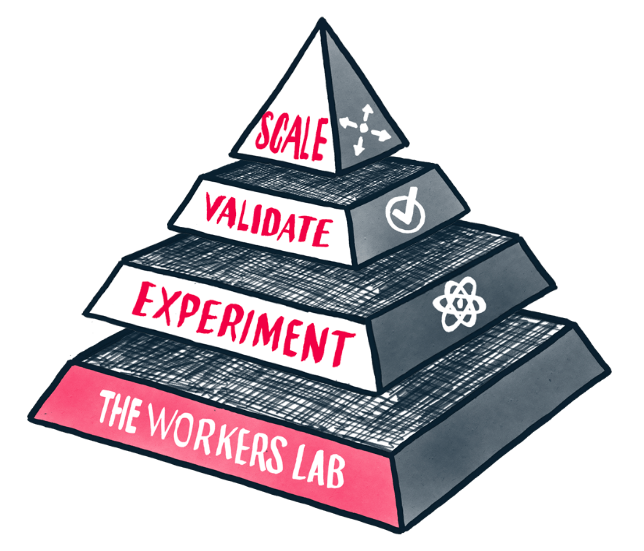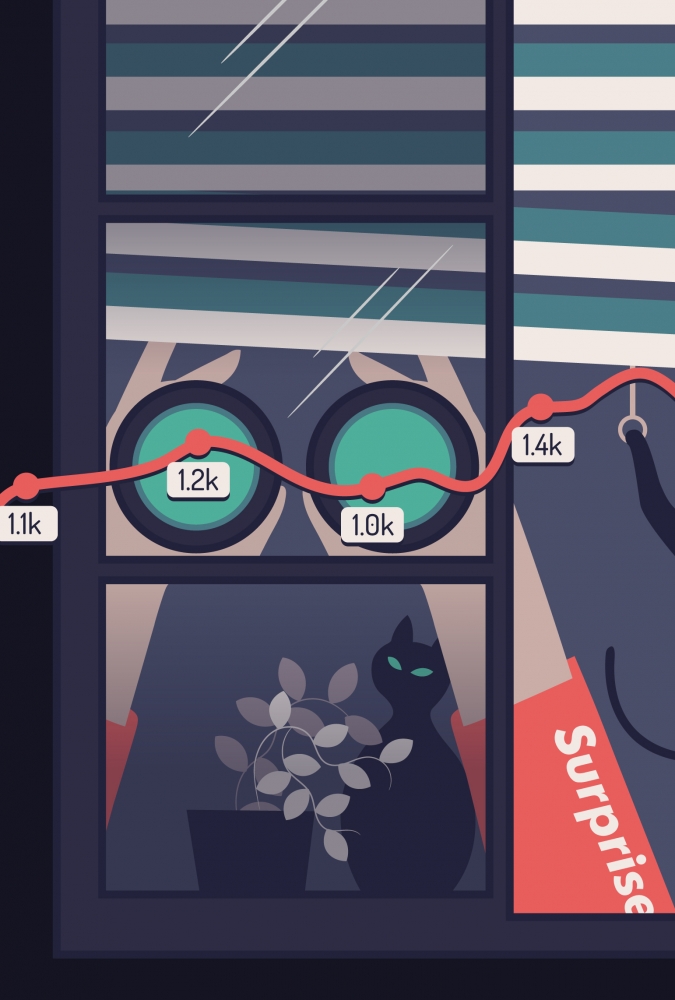Carmen Rojas is the CEO of the Workers Lab. Previously, Carmen was the acting director of collective impact at Living Cities; the director of strategic programs at the Mitchell Kapor Foundation; the coordinator of the San Francisco Redevelopment Agency’s Taskforce on African American OutMigration; and the coordinator of the Social Equity Caucus, a program of Urban Habitat. She holds a PhD in city and regional planning from the University of California, Berkeley and was a Fulbright Scholar.
 Can you tell me a little bit what is Workers Lab? What are you doing? How is it structured?
Can you tell me a little bit what is Workers Lab? What are you doing? How is it structured?
Carmen: We are a lab that supports worker organizers and entrepreneurs, mostly by giving people funding to try to find new ways to build powerful workers beyond collective bargaining.
We were founded by folks in the labor movement, really to help them say that collective bargaining is one way that workers can be empowered, but that there are a whole host of other ways as well. Let’s actually give resources to those other ways, so it’s not a zero-sum game. Whether there’s collective bargaining or not, there could be a rich ecosystem of alternative solutions at play. Right now, that ecosystem doesn’t yet exist.
From a practical standpoint, Workers Lab is a mixed organization, so we have C3 IRS class, which means we are a nonprofit. Also, Worker’s Lab raises money through traditional philanthropy and donors who want a tax write-off. We have a C4 class where we park our labor dollars, and it allows us to give money to candidates who are running for office or the issues that are aligned with the things that we care about. Then we have an “Inc” label that acts as our lending and investment vehicle. We try to run that gamut, have as dynamic of a capital structure as possible, so that we aren’t limited in the ways that we can attack a problem and provide solutions.
The nonprofit sector is just never going to have enough money or power to change the issues that it wants to change. It’s always going to be beholden to very rich people who actually don’t want to see that type of significant change to the system. Worker’s Lab has created a really dynamic set of capital institutions that are in conversation with each other, so we’re not opting out to that. Where somebody is running for office, we can give money. Then if they need C3 dollars for an implementation, that’s really easy to do, and if they need lent debt, we do that as well.
Early on, we started doing equity investments. It proved to be problematic. We started to replicate the bullsh*t of venture capital where we’re taking ownership stake in people’s companies. To be honest, we didn’t want to own people’s companies. We just wanted to get our money back. We do very low- to no-interest debt, mostly for the purpose of creating capital history for people who want enterprises and want to access market-rate debt or investment. Then those people have some evidence that they can manage it. It’s great for us too because it creates a revenue source for us as an organization. Most of the money that we give out is free.
Worker’s Lab is approaching the innovation ecosystem from a completely different angle. How did you spin the tech accelerator model on its head and use those tools and methods for disrupting those who are often doing the disrupting when it comes to impacting the labor force?
Carmen: There are a couple of dynamics. First on the tech side, there seems to be a capital structure that’s incentivizing the tech sector to really undermine workers — not only taking away their power, but their economic well-being. Workers are seen as ancillary to business or enterprise development and not core to business development. There’s a logic that is informing that. It’s really normalized, frankly, by how venture capital has moved, but also we see it with hedge funds and private equity.
There seems to be a real disconnect between the economy, logic and language of the economy to the labor market. There’s a capital dynamic that’s disruptive. I think on the other issue is a very practical reality that the labor movement just does not have power like it once had in this country. We currently have the lowest rates of unionization, ever. So while Conservatives have been implementing policies that weaken unions, you also have a labor market that has shifted in very real ways. These are happening concurrently.
In six years, half the jobs in America will be contract jobs. Those types of jobs are really difficult to organize for and I don’t think the labor market has kept up with the pace or the changing nature of work that has less to do with technology, automation, or innovation. The current labor market setup has more to do with the social contract that once existed between workers and employers. That is unraveling or fissuring in a way that we haven’t taken into account. It’s not going to be the solution in a movement.
The third dynamic, and probably the one that’s most important to me, is that the power of government has been gravely wounded. On the one side, Progressives have given up on government as a site for contestation to actually set the terms for what not only work looks like, but for how the economy operates, and for what we value as work. On the other side, those within government don’t know how to articulate either a progressive or a regulatory regime over the economy. There’s a deep, deep tie between the financialization of the economy and, frankly, the failure of government to actually talk to these matters.
The fact that we don’t discuss taxes as a real option (it’s always a nonstarter) is absurd to me. The fact that we had Mark Zuckerberg going to talk about the way that Facebook played a role in shifting this last election, while most elected officials did not have language in which to talk about their business model, is absurd to me. Then there’s the fact that we act like the vast majority of our elected officials are asking people like Mark Zuckerberg whether we should regulate them, not how to regulate them. Never in history have we had such a disconnect between the rulers of the state and the rulers of the economy. The rulers of the economy are dominating the state. As a Progressive, I feel like we have given up on government as much as Conservatives have given up on government. At Workers Lab, we are actively starting to think about what experiments we can support that help give some examples of what a 21st Century safety net looks like, what a new state can look like – what phoenix can rise from these ashes. On the flip side, we’re really doubling down on supporting people who are running for office that we believe are wholly aligned with our values.
At Workers Lab, we are actively starting to think about what experiments we can support that help give some examples of what a 21st Century safety net looks like, what a new state can look like – what phoenix can rise from these ashes.
I know you have a Ph.D. and a Fulbright. Most people, even when focused on social justice issues, take those kind of credentials and jump into the traditional nonprofit world. What drove you in this different direction?
Carmen: I finished my Ph.D. in 2008. Frankly, it was just not a great time to be in the academic job market. Also, I worked through most of my Ph.D. and did field work in Venezuela and wrote my dissertation on the economy in Venezuela and Hugo Chávez. I was really disillusioned that there’s a disconnect there in Latin America. There’s just such a rich history of the public intellectuals. In the U.S. context, it just didn’t feel like there was a rich history of progressive public intellectuals. There were the folks that write things like Bowling Alone. In the States, Neoliberals occupy the public discourse. But on the Left in general, there just isn’t a big tradition of engaging in public contribution here.
I went to work in a foundation. I’ve always been troubled by the fact that big philanthropies and charities essentially act as a tax write-off for the super rich. It’s a triple benefit for the wealthy. They don’t pay taxes, they keep their money, and they decide where their money goes. Oftentimes, in doing all three of those things, they end up actively undermining the functioning of government.
I went right in and worked here for a tech foundation. I was not surprised, but intrigued, and wanted to fix the problem of how capital for social movements actually moved. I saw on the investment side of the foundation, they would invest money into companies like Uber. On the other side, they’d say, “Here, nonprofit, take $10,000 and shut down a refinery in Richmond,” or whatever it is that we were funding. The money was not proportionate to the change that we were hoping to see. It’s given the opportunity to build an organization and I really wanted to build one that could actively contest for what social movements look like in the United States.
I also think that as the Left we’ve, one, given up on government, but two, actually given up the space of the economy. We are so anti-capitalist that we don’t understand how capital works and are, frankly, negligent of our responsibility in creating real change to people’s lives that isn’t adversarial. We don’t create new economic models here. We oftentimes don’t have the money, but a lot of us just are like, “I’m an anti-capitalist, but I take money from this Ford Foundation,” not understanding the implications of what that means for being an actor in an economy who, frankly, you’re turning your nose down, at best.
In a way, your model is also destabilizing the structures that traditional nonprofits utilize to address workers issues. You touched on some of the flaws with existing system earlier– such as the fact there is a often a master holding the checkbook that most public interest groups are beholden to. But how do you see what you’re doing at Workers Lab being a model for the future of dealing with social justice issues, workers’ issues, and a greater progressive agenda?
Carmen: Mostly it’s creating a road. It’s creating a road out of the nonprofit sector into the for-profit, out of the nonprofit sector into government, and creating pathway with no friction for the person who wants to get on that road and walk it. We don’t produce whitepapers. I don’t want to retell the obvious thing like poor people are poor, that half of working people are poor, and that the vast majority of homeless people in the streets in the Bay Area are working people. We know that. I am more interested in actually talking about the very ways in which the system that we live in was created to keep people poor and that we need to make a new system.
Moving away from the absurdity of the current language around poverty and working people, which is people, an individual making a set of choices without calling out the fact that we tie that individual’s hand behind their back, and their foot behind their back, and made it impossible for them to make any other choices but the ones in front of them. I feel like the biggest ways that we disrupt the sector are by calling those systems out.
Because Workers Lab was founded with funding from the labor movement, we have a level of freedom. We can talk about politics; which is interesting just to see most nonprofits can’t talk about such things. They legally feel constrained in their ability to actually talk about politics, even though politics informs their day-to-day work. It’s just crazy to me. The other part of it is actually by behaving radical, we invite radical behavior.

When we talk about “innovation” — and certainly you are harnessing innovation systems for good at Workers Lab — but in a greater sense, how do we actually make “innovation” ethical? We can’t predict results. Take Airbnb, I know they had absolutely no intention to cause rising rents and trigger gentrification the way they have. But on the other hand, there’s probably something that could be put in motion to better scenario plan for potential negative impacts or work toward course readjustments, right?
Carmen: Yes, again, this is, not to beat a dead horse, but government. Right? The problem with the relationship between government and companies like Airbnb, or Uber, or Lyft is that these companies run whole-hog to aggressively grow, and then the collateral damage appears, and then we, as the economy, try to regulate. It’s a day late and a dollar short. These Valley startups act as if there are no rules or consequences to their behavior. It’s crazy. It’s honestly really crazy.
I think that we, as a whole, need to have a different way of approaching innovation so it’s not seen as a zero-sum game, either you have regulation or you have innovation, but when you have a dynamic and thoughtful interplay between innovation and regulation so that the consequences aren’t self-driving cars that are killing people; or taxi drivers that are killing themselves when their medallions become worthless; or people being displaced from their houses because landlords would rather Airbnb the buildings than actually rent them out to renters. I feel like it’s Pollyanna-ish. Everybody at Airbnb, across the board, “We didn’t know this thing was going to happen.” So you shouldn’t have gone whole-hog. We should have had a regulatory environment that said, “Let’s try this here and see what’s going to happen to create a set of norms.” Innovation has come to mean breaking the rules and making the rules, in a context where no rules exist, and that’s just unsustainable for so many things. For us, as an organization, we try to innovate all the time. I’m always really clear to anybody who gives us money, to anybody we partner with, that we’re lucky right now because we’re young and small. 50% of the things that we do works out, but 50% doesn’t. I’m really honest with people. That things we try often don’t work.
Technology just doesn’t actually work to build worker power. It doesn’t. As an intervention, Facebook is not super helpful. You need organized workers. You need a labor movement. I think that there’s a level of dishonesty about the collateral damage that innovation has brought to bear on the lives of people and no real reckoning, and no space for reckoning, to be honest with you. The media is not talking about these issues in a holistic way. They don’t want to tell a complex story when it’s easier to write puff pieces about these young capitalist poster boys.
I think that we, as a whole, need to have a different way of approaching innovation so it’s not seen as a zero-sum game.
Here’s my last question for you. As we’re moving into this era where innovation is ever increasing, and there’s more and more pressure on wages, a global economy without economic borders — all the factors we know about– plus new pressure from advanced technologies like robotics and AI, how is this going to end up well for the average family? How do workers stand up to this storm and fight this impossibly large wave of disruption? What can change this momentum?
Carmen: Organizing. I honestly think that organizing people can make a fundamental change. The teachers’ strikes, for me, this last couple of months have been such a huge inspiration. We’re interviewing someone for a job here and one of the candidates is from the teachers’ union, and he was like, “We had nothing to do with that (the move to strike). It was just everyday educators were pissed off that they take care of and educate our kids, and are making $50 a day.”
Yeah. I think it’s organizing. I think it’s organizing with a vision towards something that we have to offer people not just a grand vision, but true examples for a progressive agenda that’s actually going to make people’s lives better. Manifesting that in the real world, in a touchable, eatable, livable way is really important to me as a leader of The Workers Lab. That’s one of the reasons we don’t spend a lot of time writing or pontificating about things. I mostly want to know that every day one working person has woken up and thinks that their life is exponentially better, that they are living a life of dignity. They’re no longer having to make impossible choices because we exist as an organization. I feel like that’s our duty. It’s actually to show in real ways what an alternative looks like.
Workers Lab is a different kind of accelerator, one that invests in entrepreneurs, community organizers, technologists, economic justice organizations, issue campaigns, and businesses to create scalable and self-sustaining solutions that improve conditions for low-wage workers. The Oakland-based Workers Lab is focused on ideas, services, and products that will achieve sufficient scale to impact workers across sectors, industries, and geographies, and result in self-sufficient revenue models.
Illustration by Ewelina Dymek



